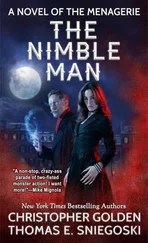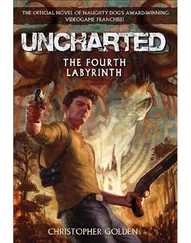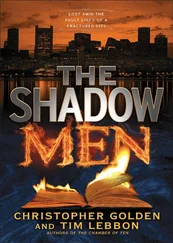She knew before she opened the door that nobody would be inside. The frosted glass glowed warmly with the daylight, but the simple fact that the door was locked had told her that the office was empty. Now she stepped inside, greeted by the almost unnoticeable static of electricity in the air, both from the lights that she switched on and from the computers that continued to hum, fans running, screen savers drifting against black desktop backgrounds.
A light cotton jacket hung over the back of Domenic’s chair. Had he worn it yesterday, or had he already been here this morning? No, that made no sense. If nobody on the team was here in the office, that meant they were all likely over at the Biblioteca.
Geena took a deep breath.
“Okay,” she whispered, her voice sounding dull and flat in the empty office.
She checked her voice mail and saved all of the messages without writing them down. E-mail could wait. Going through papers on her desk, she found Howard Finch’s business card and slipped it into her pocket. She could call him from her cell on the way to the Biblioteca. She’d have to call Tonio as well, and then catch up with her team on the status of the flooded chambers. If she timed the water bus right, she’d be arguing with Adrianna Ricci at the Biblioteca in forty-five minutes.
Geena shut the lights off and stepped back into the corridor, pulling the door shut behind her.
“Leaving again so soon?”
The voice startled her and she dropped her keys. Even as she turned, she realized it was Tonio and felt foolish for jumping. Tonio Schiavo was fifty-one years old, with a proud Italian nose, a slight paunch, and thinning hair, but he maintained a certain suave handsomeness. Charm could do wonders for a man. The department head smiled and stooped to pick up the keys for her, handing them over.
“I’m sorry,” he said. “I didn’t mean to frighten you.”
Normally she would have bristled as the presumption that she had been scared and given him crap about being a chauvinist. Today she barely noticed.
“I’m a little jumpy,” she said, locking the office door.
“After nearly dying on Monday, I’m not surprised,” he said. His blue eyes softened with genuine concern. “You’re okay?”
“Okay? No. I’m upset about the manuscripts we lost—”
Tonio smiled. “Be happy with what we’d already recovered. Your team did nothing wrong.”
“You seem far calmer about this than I expected,” Geena said, eyes narrowing. “Shall I assume the BBC is responsible for your good mood?”
“You should,” Tonio replied. “Mr. Finch is at the site waiting for you. His camera crew ought to be here tomorrow.”
Geena nodded. “Fine. It gives us a day to plan. I wanted to talk to you about sending divers down—”
“I agree,” Tonio said immediately. “In fact, I spoke with Sabrina about it yesterday.”
She paused, unhappy that they had been working around her absence, though she knew they had done it for her own benefit.
“So what’s the plan?” Geena asked.
Tonio must have sensed her irritation, for he shook his head immediately.
“No, no, this is your project, Geena. One hundred percent. It isn’t mine or the BBC’s or anyone else’s but yours. I’m just here to facilitate for you—”
“I know that,” she assured him.
“Good. In any case, Sabrina is getting a team together. She knew she had to wait on you before sending them down. I want the whole thing on film, of course, and so does Finch. The BBC has asked that you wait until their camera crew can be ready as well. That might be tomorrow, or possibly Friday. How does that sit with you?”
“That’s fine. It’ll give us time to do at least a preliminary catalog of the materials we managed to save yesterday.” She glanced back at the closed office door. “What are they doing over there now?”
“Cleaning up as best they can,” Tonio said. “Making sure the Biblioteca staff will stay away. Ramus is going over plans with the city engineer. Domenic is—”
“Is Nico with them?”
Tonio arched an eyebrow. “I assumed he was with you.”
He’d chosen his words carefully, as always, talking around the relationship without ever directly acknowledging it. And, as always, Geena would pay him the courtesy of doing the same.
“I haven’t seen him this morning,” she replied.
“Ah,” Tonio said, nodding as though he understood. “Well, Sabrina didn’t say whether or not he was at the site, but you could try her on her mobile.”
Geena smiled, knowing it would come off as false but unable to stop herself. “That’s all right. I’m headed over there now, anyway. I’m supposed to be running this show after all.”
Tonio nodded. “All right. Keep me up-to-date.”
They parted ways, Tonio’s heavy footfalls marking his retreat even as Geena retraced her own steps along the corridor. She needed caffeine, and hoped that the little café she liked just off St. Mark’s Square would be open. She would talk to her team, then drag Nico away for a coffee and a frank conversation about what the hell was going on in his head.
If he was there, of course.
Geena hurried toward the small dock where the water bus stopped every thirty minutes or so—though in Italy that might mean twenty or forty-five minutes instead of thirty, or not at all for hours.
She waited alone, the summer sun glinting off the dark water of the canal, the day quickly warming up. There’d been no opportunity for her to see any weather forecast, but so far it seemed to be shaping up to be what her father had always called “a scorcher.”
Sighing and impatient, she pulled out her cell phone to check the time—8:36 a.m. Staring at the phone, she thought about calling Sabrina or Domenic to ask if Nico was there. It would be the simplest thing to do. But if he wasn’t with them, she would be facing a serious problem. She had a job to do, people counting on her, and a multimillion-dollar project in her hands. But if Nico wasn’t at the Biblioteca, the temptation to head off in search of him would be almost too much to resist.
Stop , she told herself. He’s a grown man. He can take care of himself .
But she couldn’t quite convince herself of that. Normally, yes. But whatever had happened in the Chamber of Ten the day before yesterday had … what? Scrambled his brain? Somehow he’d been blasted with memories that did not belong to him, and they were confusing him, even changing him. That scared her.
She put the phone away. To the Biblioteca first. Get things under control. If Nico wasn’t there, she could go hunt him down after she made sure everything was on track for the arrival of Howard Finch’s BBC colleagues the next day.
To the east, she saw the water bus churning in her direction across the canal. At least she wouldn’t be waiting out here for—
* * *
— the book feels warm in his hands. He caresses the supple leather of the cover and finds it unnervingly akin to human skin. But he can almost feel the dark promise that lies within its pages, so any hesitation is immediately dismissed. Forty-seven years he has been searching for The Book of the Nameless. Petrarch had publicly claimed not to have a copy, but his private writings, found in his hidden library, had revealed the truth. He had briefly owned it, but given it to a trusted friend, a scholarly monk. Petrarch had not wanted the responsibility inherent in ownership of The Book of the Nameless. Always the humanist, he had been afraid to unleash its power, afraid to hold that kind of magic in his hands .
Now he has acquired the very same copy that Petrarch had so foolishly given away, and he covets it even more than he had before it was his. Seconds in his possession, and already he guards it jealously. If half of the legends surrounding this book are true, his enemies—the would-be mages plotting against him—will not stand a chance. If they ever had .
Читать дальше












